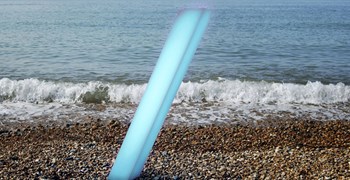Heritage Lottery Fund awards £1.7 million to two projects highlighting history of disability in the UK
This article originally appeared on Culture24.
A digital archive documenting the Disability Arts Movement and an investigation into eight important disability heritage sites are given vital funds by the National Lottery
 A mural of Edward Rushton by Mick Jones at The Royal School for the Blind in Liverpool© Courtesy Accentuate
A mural of Edward Rushton by Mick Jones at The Royal School for the Blind in Liverpool© Courtesy AccentuateAwarded by the Heritage Lottery Fund, the money will enable the projects to discover and share with wider audiences two very different aspects of disability history.
“2015 marks the 20th anniversary of the Disability Discrimination Act," said Carole Souter, the Chief Executive of the fund, praising the proposals.
"These projects offer a timely opportunity to delve into a part of our national story that is not well understood.
“I’m personally really looking forward to learning more about the stories they uncover.”
With a grant of £853,600, Shape Arts, an arts organisation led by disabled people, plans to create a digital archive documenting the history of the Disability Arts Movement since its inception in the 1970s, cataloguing more than 1,000 pieces of artwork, print and film footage created by disabled people.
 Great Britain from a Wheelchair© Courtesy Shape Arts
Great Britain from a Wheelchair© Courtesy Shape Arts“As a result of this funding we hope to preserve the unique heritage story of the Disability Arts Movement, chronicling a time when disabled artists and their allies helped change society, helped change the law, and made great art while fighting the barriers they faced," said David Hevey, the Project Director.
“We want to pioneer new and innovative digital ways of telling this amazing story, using touring digital cinema, online films and moving image, to tell this heritage story across digital platforms, so that millions can enjoy, can engage and can be moved by it.”
A second grant of £878,500 is for Accentuate, an agency which is part of creative development company Screen South and aims to challenge attitudes towards disabled people.
They plan to set up a three-year project, History of Place, which will investigate eight important built heritage sites, helping to uncover their history in relation to disabled people and then hold community workshops, talks and exhibitions across the country in 2018.
Esther Fox, the Programme Executive at Accentuate, promised to "uncover a wealth of archive material" which will tell the story of the people who inhabited and designed the buildings, including a hospital, schools for the blind and deaf and a guild for the disabled.
“The national touring exhibition will be the first of its kind and we are proud of the outstanding partnerships we have with three key museums across the country which will enable the wider public to also access this relatively unknown heritage,” added Fox.
Some of the sites due to be included in History of Place are:
Maison Dieu, Kent – a hospital founded in 1230 where records of a skeleton of a severely disabled man aged 35-45 have recently been uncovered. Also one of the resting points on the Canterbury pilgrimage route.
The Royal School for Deaf Children, Margate – the UK’s first public school for deaf children founded in 1792.
The Guild of the Brave Poor Things, Bristol – a self-help organisation for disabled people built in 1913. Believed to be one of the first buildings designed specifically for disabled people.
The Liverpool School for the Indigent Blind – established in 1791 by the abolitionist Edward Rushton this was the first specialist school for the blind in the country and second in the world, after Paris.
 Maison Dieu in Kent© Courtesy Accentuate
Maison Dieu in Kent© Courtesy AccentuateMore from Culture24's History & Heritage section:
£4.89 million grant helps the Royal Air Force Museum's centenary plans take off
Cheshire's Lion Salt Works transformed from derelict factory site to multi-million pound museum
Community archaeology quest begins for remains of 13th century Benedictine Priory in Norfolk











